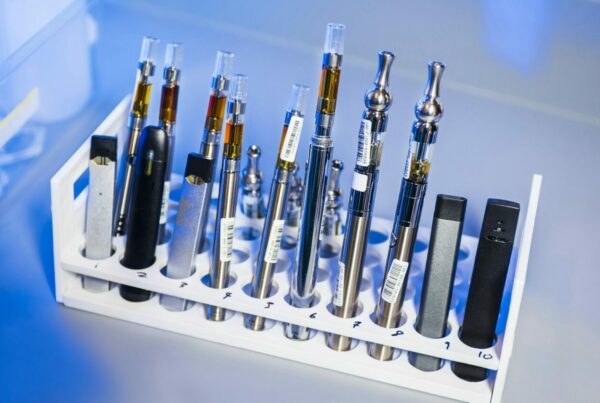N, N-Dimethyltryptamine (DMT) is a substance found in various plants and animals, known for its short-lived yet potent psychedelic impact when ingested.
There is growing evidence that suggests DMT, which naturally occurs in the body, plays important roles in the peripheral and central nervous systems, possibly functioning as a neurotransmitter.
While DMT can trigger strong psychedelic experiences, it typically does not result in many harmful effects, apart from potential cardiovascular problems when taken in large amounts through injection.
Let’s explore DMT and its diverse functions, ranging from recreational use to its promising potential in scientific investigations and therapeutic uses.

A Brief Introduction to DMT: What is it?
| Attribute | Information |
| Name | N, N-Dimethyltryptamine (DMT) |
| Type | Indole alkaloid |
| Occurrence | Naturally exists in a variety of plants and animals |
| Psychoactive Effects | Produces brief yet intense psychedelic experiences when ingested. |
| Consumption Method | Can be smoked, injected, or orally taken. |
| Effect Duration | Short duration, generally between 5 to 30 minutes. |
| Chemical Structure | Comprised of a tryptamine core with two methyl groups attached to the nitrogen atom in the amine group. |
| Metabolism | Rapidly metabolized by the body, degraded by monoamine oxidase (MAO). |
| Cultural Usage | Historically used in various ceremonial and shamanic practices by indigenous cultures. |
| Alternate Names | Dimitrifantasia, businessman’s trip, Businessman’s special, 45-minute psychosis, spiritual molecule |
The Role of DMT in Mental Health
N, N-Dimethyltryptamine (DMT), a compound famous for its potent psychedelic effects, is gaining attention for its potential benefits in mental health. Despite its traditional association with powerful visionary experiences, recent research suggests a connection between DMT and mental wellness.
Effects on Psychological and Emotional Well-being
DMT is known for inducing profound emotional experiences and altering states of consciousness, which could potentially pave the way for new therapeutic methods to address mental health problems, enhance emotional processing, and provide new perspectives on personal traumas.
Neuroplasticity and Brain Function
Research suggests that DMT could influence neuroplasticity, thus enhancing the brain’s ability to adapt and reorganize. Investigating its impact on synaptic plasticity and neural connectivity might offer potential remedies for conditions associated with neural misalignment.
Prospective Therapeutic Applications for Mental Health Disorders
Initial studies point to the potential of DMT in treating conditions such as depression, addiction, and PTSD. Its ability to induce mystical or spiritual experiences could offer a unique angle for psychotherapy and aid in transforming negative thought processes.
Investigating the natural presence of DMT in the body sheds light on its role in mental health resilience, stress management, and overall psychological well-being. Understanding how the body controls internal DMT levels could lead to the development of new therapeutic strategies.
DMT and Mental Health Disorders
| Mental Health Disorder | Description | Potential DMT Effectiveness | Benefits |
| Depression | A mood disorder marked by persistent sadness, disinterest, and reduced motivation | Initial research suggests DMT could help alleviate symptoms by inducing deeply emotional experiences. | Its rapid onset and ability to trigger transformative experiences may provide innovative therapeutic approaches for modifying negative thought patterns and enhancing emotional processing |
| Post-Traumatic Stress Disorder (PTSD) | A mental health condition triggered by traumatic events, leading to flashbacks, extreme anxiety, and intrusive thoughts | Preliminary research indicates DMT’s potential to manage symptoms by inducing spiritual or mystical experiences that could help patients reshape traumatic memories | The capacity of DMT to induce altered states of consciousness could assist in facilitating emotional processing and offering a fresh perspective on traumatic experiences |
| Addiction | A complex disorder characterized by compulsive engagement in rewarding stimuli despite adverse consequences | Some studies suggest a role for DMT in interrupting addictive patterns and reducing substance cravings | The ability of DMT to trigger intense and transformative experiences might help individuals alter their behavior patterns and tackle underlying reasons for their addiction |
Approach to Using DMT
DMT, renowned for evoking brief yet powerful psychedelic experiences, can be utilized in multiple ways. The chosen method of use often hinges on the desired intensity and duration of the effect.
Smoking:
DMT, when smoked in a pipe or vaporized, necessitates careful temperature regulation to avoid overheating and burning the compound. When smoked, DMT induces a nearly instantaneous psychedelic experience, generally lasting from 5 to 15 minutes.
Oral Intake:
Taking DMT orally prompts slower onset effects that persist significantly longer, often for several hours. This is due to the more gradual breakdown of DMT when paired with an MAOI.
Injection:
DMT can be directly injected into the bloodstream for rapid and potent effects.
This approach results in an immediate and intense experience, though it necessitates precise dosage and carries increased risks.
Insufflation (Snorting):
Snorting DMT initiates a slower onset of effects compared to smoking, but potentially provides a more prolonged experience.
Sublingual or Buccal Administration:
When absorbed through the oral mucosa, this method offers an alternative to smoking and delivers a longer, though less intense, experience.
Determining Therapeutic Dosage: N, N-Dimethyltryptamine (DMT)
For smoking, the recommended dosage falls between 20 to 40 mg, while for intravenous use, the suggested dosage is 0.2 to 0.4 mg per kg of body weight. These dosage recommendations are primarily applicable to clinical research and are especially pertinent for intravenous use.
- Higher intravenous doses are associated with intense visuals, temporary loss of control, and a combined state of anxiety and euphoria
- Intriguingly, lower doses have demonstrated less desirable effects
- Recreational doses of smoked DMT generally range from 40 to 50 mg, occasionally going up to 100 mg
- Various intravenous doses of People who have experienced near-death-like episodes associated with DMT (7, 14, 18, and 20 mg solutions) have reported enduring positive changes in their psychological health.
Availability of DMT
ProductsOsmosis – 4-ACO-DMT Ethereal Essence Tincture
This tincture is marketed as containing 4-Acetoxy-N, N-dimethyltryptamine (4-AcO-DMT), a DMT variant. Tinctures are liquid extracts designed for oral intake, and this specific product could offer a distinctive experience compared to conventional DMT.
Lucid Supply Co. – 5-MeO DMT Vaporizer
This product is a vaporizer that delivers 5-Methoxy-N, N-dimethyltryptamine (5-MeO-DMT). 5-MeO-DMT, the active ingredient, is known for its potent, transformative, and typically brief experiences.
Integral Alchemist – Acacia – 1ml DMT Vape Cartridge
The Integral Alchemist’s DMT vape cartridge is pre-loaded with N, N-Dimethyltryptamine. This product is likely aimed at those who favor a discreet and convenient way to consume DMT.
Deadhead Chemist – 5-Meo-DMT Cartridge
This cartridge houses 5-Methoxy-N, N-dimethyltryptamine (5-MeO-DMT), a substance known for its deep and powerful effects.
Potential mental health benefits might be linked to personal growth, spiritual experiences, or therapeutic applications intended to enhance emotional health.
Deadhead Chemist – N, N DMT Cartridge
Another offering from Deadhead Chemist, this cartridge contains the traditional N, N-Dimethyltryptamine. Cartridges provide a user-friendly approach to DMT consumption, resulting in a more consistent and steady experience.
Final Remarks
The consumption of N, N-Dimethyltryptamine (DMT) in
How to use DMT responsibly for mental health?
Emotional preparedness, understanding personal tolerance, and having a safe and supportive environment are crucial aspects to consider.
Additionally, one must take into account potential risks and benefits, which can be better understood through comprehensive research or consultation with mental health professionals or experienced users.
Embarking on the journey of mental health therapy is thrilling yet complex. The substance’s ability to induce intense albeit brief psychedelic experiences opens up possibilities for new therapeutic approaches.
Early studies point towards its potential in influencing emotional processing, personal growth, and possibly
The profound effects of mental health therapy necessitate careful consideration and responsible usage.
If you’re keen on exploring DMT products responsibly, reliable sources like Shrooms Edibles Online Canada Online Dispensary provide guidance and a variety of options.
Frequently Asked Questions:
How do different DMT products affect mental health?
For instance, vaporizers may have immediate effects, while tinctures or vape cartridges could provide more controlled and consistent dosages.
Introducing derivative compounds or 5-MeO-DMT can result in different degrees of intensity and various types of mental health effects.
Such nuances underline the importance of choosing a DMT product that aligns with individual preferences and mental health goals.
Can DMT induce enduring changes in mental health and personal growth?
Anecdotal evidence suggests that DMT-induced experiences may have extended effects on mental health and personal development.
Significant or transformative experiences, such as those resembling near-death experiences, are often associated with lasting positive changes in psychological health and personal growth.
Despite their intensity and brevity, these experiences usually lead to introspection, spiritual insights, and a sense of unity or enlightenment.
People commonly report a refreshed perspective on life, improved emotional resilience, and an enhanced appreciation for life post these experiences.
What’s the most effective method to use DMT for mental health?
It’s essential to make well-informed decisions, which involves thorough research and understanding the effects of the compound.
Advice from mental health professionals or seasoned users can provide valuable understanding into potential risks and rewards.
Assessing personal tolerance and mental readiness is equally significant, along with ensuring a supportive and safe setting for the experience.
How does DMT stand in comparison to other psychedelics like psilocybin or LSD in the context of mental health therapy?
DMT’s effects, duration, and intensity exhibit differences when compared to other psychedelics such as psilocybin or LSD. It is particularly noted for its brief duration.
Mental health therapy approaches for high intensity, short-acting psychedelics like DMT require special considerations, differing from the strategies used for longer-lasting psychedelics.
Recommended Additional Reading:





